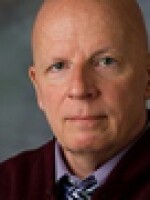You've seen them during the coronavirus pandemic: ordinary people on the streets wearing surgical masks or other face-coverings.

During mid-March I donned a mask and walked from WAMC's studios to the Albany County Office building downtown. I encountered three other pedestrians wearing masks, and asked each one the same question people had been asking me: "Are you sick?" And they all responded: no, they were hoping to protect themselves. I've also seen supermarket employees and postal workers wearing masks while on duty.
The Wall Street Journalreports U.S. workers who wear masks on the job have met resistance. Some have been told masks would scare people.
One argument maintains that if you have the flu or COVID-19, your mask would make you 50% less likley to infect someone else.
Jian Yu Hou has lived in the U.S. since 2015 and has authored articles on facemasks for Chinese periodicals. She says masks first became ubiquitous on the mainland around 2003 during the SARS epidemic, and mandatory as COVID-19 progressed.
"Some experts said, wearing face masks can effectively prevent the disease, the spread of the disease and also our neighbor country, Japan, when they have some disease problem they face, they wear facemasks. So I think it's also a culture thing."
Conceding masks are now impossible to find in local stores, Hou says its puzzling that Americans didn't embrace them early on when news of the pandemic first came out of China, while Chinese living in the U.S. began stocking up.
"In January in New York City when I, when I told my New Yorker friends to buy some face masks, and they said, 'Oh, it's already sold out in Manhattan', and I told them, 'hey, try to get some in Brooklyn' but Brooklyn also sold out."
Masks of various types from simple paper surgical to the N95 respirator variety all were in short supply by mid-March, although available in limited quantities online. Albany state Assemblywoman Pat Fahy has seen people out and about wearing masks:
"I haven't worn one yet. Somebody kindly gave me an extra last night and I felt a little guilty taking it, but I'm going to have it just in case because I'm exposed to so many people still, as I go into my office and as we go into work."
Hou thinks Fahy and others should wear a mask.
"If people can get some facemasks, we should wear facemasks, because China has the experience. And also I think CDC shouldn't let people to take risk of not wearing facemasks. They said, 'we don't recommend people to wear facemasks, because we have limited supply of facemasks.' If they don't have enough supply, why not just reopen some factories, or get some donations from other countries, instead of telling Americans not to wear masks. That's a risk."
New York Governor Andrew Cuomo agrees more masks should be manufactured; not for the public, but for health care workers.
"Yeah we think the federal government can say we need PPE equipment, we need gloves, we need masks. You know when the CDC starts putting our guidance, you can use a scarf as a mask. You know, it's time to make more masks."
Fahy says she's been working with St. Peter's Health Partners regarding homemade masks.
"My feeling is even if the mask may not work in the hospital, the homemade mask might be available to that second tier of workers. Let's say grocery store workers, firefighters, others as we see the shortage on the N 95 masks. Maybe there's another place for some of these homemade masks."
Albany County Health Commissioner Dr. Elizabeth Whalen says the public doesn’t necessarily need masks.
"No at this point, I still would not recommend individuals wear surgical masks that are not symptomatic, for a multitude of reasons. Surgical masks are not found to be particularly helpful for members of the public to protect themselves. They're good for containing a source of infection. So if an individual has a cough, if they are going in to be assessed in a local care facility or a hospital, they should let the facility know in advance 'I have a cough,' and they'll be masked before they go in to protect the health care workers that they encounter."






